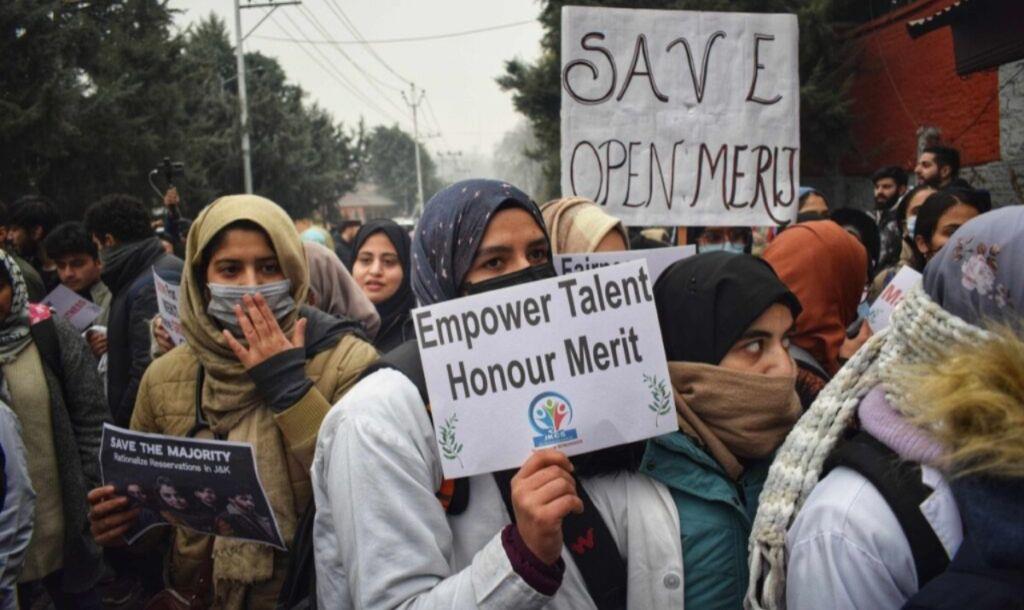From Hope to Humiliation: Kashmir’s Youth Trapped Between Leaked Papers and Lost Merit
By: Javid Amin | 24 Aug 2025
A Generation Betrayed
On August 24, 2025, the JKSSB Junior Engineer (Electrical) exam was abruptly cancelled after shocking allegations of a paper leak. Videos surfaced online showing candidates solving the exact questions before the test had even concluded.
For thousands of aspirants who had travelled through sleepless nights, power cuts, curfews, and economic hardship, this wasn’t just an exam cancellation—it was a betrayal of trust.
This incident is not isolated. It is part of a growing pattern of systemic failure that has haunted recruitment in Jammu & Kashmir for years. Behind every cancellation lies a collapsed system—opaque decision-making, zero accountability, political silence, and an unending assault on the dignity of Kashmiri youth.
The burning question today: 👉 Is merit even a currency in Kashmir anymore—or has it been devalued into mere illusion?
The Paper Leak Epidemic: Anatomy of a Broken System
1. A Timeline of Recurring Betrayals
-
2018–2025: Multiple exams under JKSSB marred by controversies.
-
2022: FAA (Finance Accounts Assistant) exam scrapped due to alleged leaks.
-
2023–24: Class IV recruitment and JE (Civil) tests questioned.
-
2025: Today’s JE (Electrical) cancellation—merely the latest blow.
Instead of reform, the cycle repeats: announce → conduct → cancel → silence. Each time, youth are left with shattered hopes and empty promises.
2. The Mechanics of a Leak
Paper leaks aren’t accidents—they’re organized crimes. From printing presses to coaching syndicates, a nexus thrives in the absence of strong oversight. The fact that papers appear on social media before exams end proves institutional complicity or criminal negligence.
3. The Human Cost
-
Financial strain: Aspirants spend thousands travelling to exam centres.
-
Mental trauma: Constant cancellations erode self-confidence.
-
Career loss: By the time exams are re-conducted, many candidates cross the age bar.
Every cancellation pushes a generation further away from employment and deeper into alienation.
Reservation Without Rationalization: A Faultline Ignored
Kashmir’s reservation framework is deeply contested. What was meant as a tool of equity has, in practice, become a tool of exclusion.
1. The Missing Economic Filter
Unlike modern affirmative action debates across India, J&K’s reservation policy lacks an economic criterion. A wealthy family can still benefit, while a poor general-category student is left behind.
2. Regional & Linguistic Discrimination
-
Marginalized linguistic groups (like Pahari and Gojri speakers) often feel sidelined.
-
Remote districts like Kupwara, Kishtwar, and Poonch face double disadvantage—poor infrastructure plus skewed reservation policies.
3. Constitutional Parity Questioned
Legal experts repeatedly argue: Is J&K’s reservation system constitutionally aligned with the spirit of equality under Article 14? The lack of clarity fuels resentment.
4. The Result: Alienation
Instead of being seen as a ladder of justice, reservations in Kashmir have become a flashpoint of division, widening the gap between communities and deepening distrust in institutions.
Who Pays the Price? Stories from the Ground
Behind every cancelled exam is a human story of crushed ambition:
-
Ruqaya, 23, from Kupwara: Studied in candlelight during power cuts. Spent ₹8,000 on travel for the JE exam—now cancelled.
-
Bilal, 27, from Anantnag: Cleared preliminary rounds in two recruitment drives, both scrapped due to paper leaks. Now at the age limit.
-
Shazia, 25, from Srinagar: A gold medalist, yet sidelined by reservation quotas without economic filters. “Merit feels like a curse,” she says.
These are not isolated anecdotes. They represent a generation trapped between systemic corruption and political silence.
Political Silence & the Collapse of Accountability
Why does this crisis persist? Because no one is held accountable.
-
JKSSB: Issues routine cancellation notices, but rarely shares forensic audit reports.
-
Political leadership: Across parties, leaders remain silent—preferring populism over reform.
-
Investigative agencies: Announce probes, but outcomes are buried in bureaucratic files.
This silence creates a trust vacuum where corruption flourishes and youth despair.
From Outrage to Mobilization: Building a Youth Campaign
This is a turning point. Outrage alone will not fix Kashmir’s broken recruitment system. What’s needed is mobilized action—a campaign that unites youth across regions, ideologies, and communities.
1. Expose the Contradictions
A coordinated fact-check and storytelling campaign can:
-
Document each cancelled recruitment since 2018.
-
Show how many candidates aged out.
-
Highlight the financial cost borne by aspirants.
2. Demand Reservation Rationalization
Youth must demand:
-
Economic filters in reservation.
-
Regional parity to ensure fair representation.
-
Transparent merit thresholds published publicly.
3. Push for Exam Integrity
-
Digital question banks with encryption to prevent leaks.
-
Third-party audits of recruitment processes.
-
Fast-track courts for recruitment scam trials.
4. Amplify Voices
-
Use hashtags like #KashmirMeritCrisis, #EndPaperLeaks.
-
Publish youth op-eds in local and national media.
-
Organize peaceful demonstrations highlighting “Merit as a Right, not a Privilege.”
The Roadmap Forward: Restoring Faith in Merit
For Kashmir’s future, reform is non-negotiable. A three-step roadmap:
-
Transparency First
-
Publish audit reports after every exam.
-
Real-time updates on investigation status.
-
Policy Rationalization
-
Introduce economic filters.
-
Ensure reservation does not penalize the poorest among general-category students.
-
Merit as a Common Language
-
Create platforms where Kashmiri youth across divides come together on a shared demand: a fair chance at dignity through employment.
Bottom-Line: From Betrayal to Movement
The JKSSB paper leak is more than an exam cancellation—it is a symbol of Kashmir’s collapsing social contract with its youth.
Generations raised on the promise of education and hard work now see recruitment as a roulette wheel rigged against them. This betrayal cannot be normalized.
The call now is clear:
👉 Merit must be restored as the foundation of opportunity in Kashmir.
👉 Reservation must be rationalized for equity, not exclusion.
👉 Accountability must replace silence.
Kashmir’s youth stand at a crossroads. They can accept systemic betrayal—or mobilize to turn outrage into reform. The future of Kashmir’s dignity depends on their choice.



